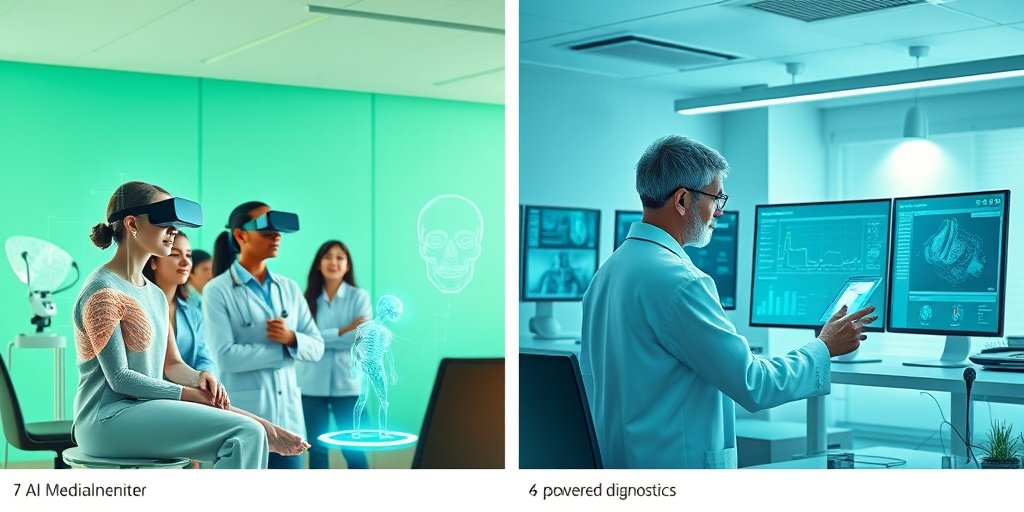⚡ Quick Summary
This article discusses how artificial intelligence (AI), particularly generative AI, can significantly enhance the training of medical students and physicians, addressing the growing demands in healthcare. However, it also highlights the challenges and ethical concerns associated with integrating AI into medical education.
🔍 Key Details
- 📊 Focus: Integration of AI in medical education and physician training
- 🌐 Global Context: Addressing healthcare workforce shortages
- ⚖️ Ethical Concerns: Need for clear guidelines on AI use
- 💰 Financial Constraints: Importance of cost evaluations and funding models
🔑 Key Takeaways
- 🤖 AI’s Role: AI can enhance high-fidelity clinical training and research training.
- 🌍 Global Health Impact: AI integration could improve healthcare delivery worldwide.
- ⚖️ Ethical Guidelines: There is a pressing need for clear ethical guidelines governing AI use in education.
- 💡 Collaborative Networks: Collaboration between institutions, universities, and industry is essential for successful AI integration.
- 📈 Sustainable Implementation: Comprehensive evaluations and funding models are crucial for sustainable AI integration.

📚 Background
The healthcare sector is facing unprecedented challenges, including a shortage of qualified professionals and increasing demands for medical services. In this context, artificial intelligence emerges as a transformative force, offering innovative solutions to enhance medical education and training. By leveraging AI technologies, we can potentially reshape how future healthcare providers are trained, ensuring they are better equipped to meet the needs of patients.
🗒️ Study
This viewpoint article explores the evolving role of AI in medical education, focusing on its potential to enhance clinical training and research capabilities. It draws on real-world examples to illustrate how AI can be effectively integrated into training programs, while also addressing the challenges that come with such integration.
📈 Results
The findings suggest that AI can significantly improve the quality of medical training by providing personalized learning experiences and enhancing the realism of clinical simulations. However, the study also emphasizes the need for careful consideration of ethical implications and the establishment of guidelines to govern AI’s use in educational settings.
🌍 Impact and Implications
The integration of AI into medical education has the potential to revolutionize how healthcare professionals are trained. By fostering a collaborative network among healthcare institutions, medical schools, and industry partners, we can create a robust framework that supports the effective adoption of AI technologies. This could lead to tangible improvements in healthcare delivery, ultimately benefiting patients and communities worldwide.
🔮 Conclusion
The article highlights the transformative potential of AI in medical education and training. While there are significant opportunities for enhancing the training of future healthcare providers, it is crucial to address the associated challenges and ethical concerns. A collaborative approach, coupled with clear guidelines, will be essential for realizing the full benefits of AI in medical education.
💬 Your comments
What are your thoughts on the integration of AI in medical education? Do you see it as a positive development for future healthcare professionals? 💬 Share your insights in the comments below or connect with us on social media:
How can artificial intelligence transform the training of medical students and physicians?
Abstract
Advances in artificial intelligence (AI), particularly generative AI, hold promise for transforming medical education and physician training in response to increasing health-care demands and shortages in the global health-care workforce. Meanwhile, challenges remain in the effective and equitable integration of AI technology into medical education and physician training worldwide. This Viewpoint explores the opportunities and challenges of such an integration. We study the evolving role of AI in medical education, its potential to enhance high-fidelity clinical training, and its contribution to research training using real-world examples. We also highlight ethical concerns, particularly the unclear boundaries of appropriate use of AI and call for clear guidelines to govern the integration of AI into medical education and physician training. Furthermore, this Viewpoint discusses practical constraints, including human, financial, and resource constraints, in AI integration, and emphasises the need for comprehensive cost evaluations and collaborative funding models to support the sustainable implementation of AI integration. A tight collaborative network between health-care institutions and systems, medical schools and universities, industry partners, and education and health-care regulatory agencies could lead to an AI-transformed medical education and physician training scheme that ultimately supports the adoption and integration of AI into clinical medicine and potentially brings about tangible improvements in global health-care delivery.
Author: [‘Ning Y’, ‘Ong JCL’, ‘Cheng H’, ‘Wang H’, ‘Ting DSW’, ‘Tham YC’, ‘Wong TY’, ‘Liu N’]
Journal: Lancet Digit Health
Citation: Ning Y, et al. How can artificial intelligence transform the training of medical students and physicians?. How can artificial intelligence transform the training of medical students and physicians?. 2025; (unknown volume):100900. doi: 10.1016/j.landig.2025.100900